While visual novels have been booming in Japan for decades, the genre continues to struggle for a foothold in the West thanks in large part to stereotypes and a lack of support from mainstream publishers. Thankfully, past and future fans of VN storytelling have a few talented indie developers to look to for their fix, including sakevisual, the team behind RE: Alistair, the Jisei murder-mystery series, and now, Backstage Pass. Recently, I was lucky enough to chat with several members of the team to talk about the new game and the VN genre as a whole.
Apphia Yu, better known online as Ayu Sakata, is a voice actress for Funimation and the founder and lead developer of sakevisual. Anime fans should also recognize the name Micah Solusod, a fellow Funimation VA who is perhaps best known for his work as Soul in Soul Eater. In addition to anime, he has been lending his voice to sakevisual games since the release of Ripples, and in Backstage Pass, he takes on the role of Adam Eaton, a musician who has known the main character since childhood.
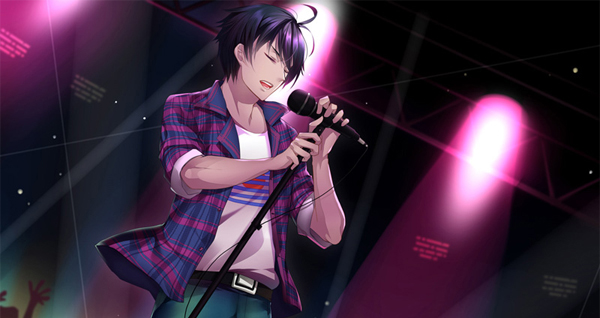
Lulin Guo, also known as tooaya, is a freelance artist and illustrator who became involved with sakevisual through NaNoRenO (an annual VN developing event hosted on the Lemmasoft Forums) and returned as lead artist for the team’s newest release. Composer Marc Conrad Tabula provided the score for the Jisei series as well as Backstage Pass and studied film scoring under Laura Perlman, a musical editor who who has worked on various well-known films, including Cool Runnings and The Lion King 2: Simba’s Pride.
Backstage Pass tells the tale of the trials and tribulations of junior makeup artist Sian, who finds herself unexpectedly swept up into the wild and wonderful world of showbiz. Though technically a dating sim, the game also incorporates industry-related elements of strategy and intrigue and features multiple paths and endings. The choice of gameplay focus – whether it’s romance, professional and personal growth, or the quest for fame and fortune – is entirely up to the player to decide. The game is currently under development, with an early access version available for purchase until the project is fully completed.
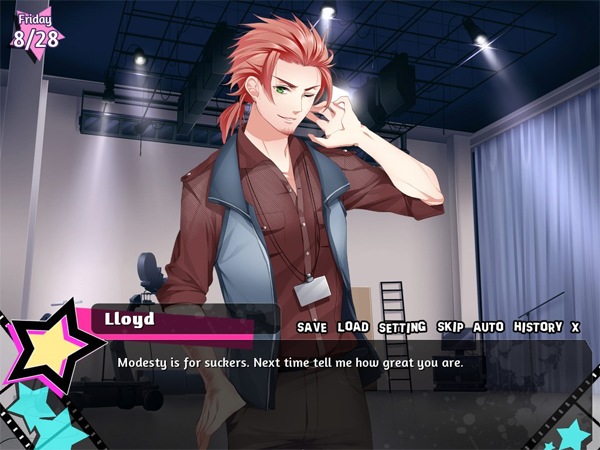
As one might expect, much of the inspiration for Backstage Pass was drawn from real experiences in the showbiz industry. “For those who don’t know,” says Sakata, “I’ve done a bit of work on stage, camera, and voiceover… it’s nothing close to a full time job, but it does give me an insider’s look into the industry, and it’s really a fascinating world. I’d say about half of the events in Backstage Pass are things that happened to someone I know, and the other half are things I heard about over the grapevine.”
As for fashion, Guo says most of the characters’ wardrobes are based on specific celebrity styles. “For all the guys, I was given a real life celebrity example that I should reference from,” she says. “I’d then do some research on what the celebrity would wear, and design outfits that would fall in that category.” However, Guo was careful to also integrate ideas found in everyday outfits at the mall and even her own closet. “These people may be celebrities, but I think they’d still wear human clothing. I didn’t want to make them wear over-the-top outfits that make the player go, ‘would people really wear that in real life?’ Because after RE: Alistair, I know [Sakata’s] amazing at writing realistic stories that everyone can relate to, and I want to go along with her writing style with my designs.”
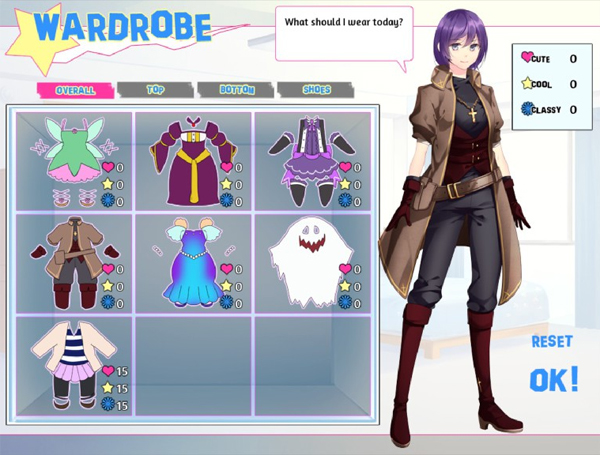
Though Backstage Pass is set in the United States, musical influences from around the world come into play as well, according to Tabula. Though the majority of the score is a combination of the sounds of popular modern bands and Japanese anime music; “There are also some tracks which don’t conform… like John’s theme, inspired by the culture of the British Isles and featuring a bagpipe, an instrument I never thought I’d be using. There are also some emotional scenes which use traditional piano and string arrangements.”
Solusod, when working on developing a musical style for his character, took cues from his own childhood home in the Pacific. “I wanted to find a balance between the acoustic/island sound I listened to back in Hawaii and modern pop. I ended up listening to a lot of musical artists and purchased a handful of instruments, gear, and software to experiment with.”
In fact, he says, it was his songwriting which ultimately landed him the role of Adam, despite being initially cast as a different character. “Ayu had asked a few people to write music for Adam but couldn’t really find what she was looking for. Ultimately, she asked me if I could give it a try. I ended up writing a silly song about a shy guy meeting a bookworm and it was enough to get the part.”
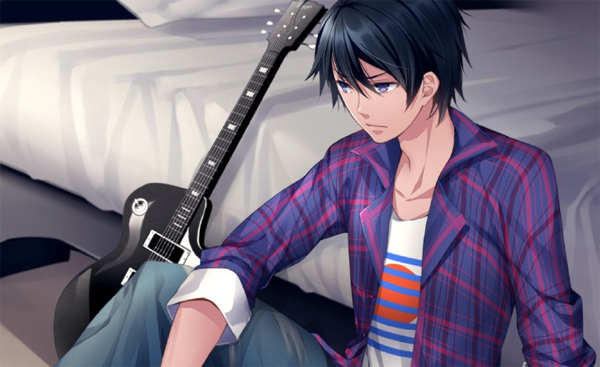
Contrary to many a misconception, high-quality (and especially high-content) VNs require just as much effort and funding to create as any other type of video game, and the process itself is quite unique. “I think the hardest thing about recording a visual novel is keeping the alternate timelines straight,” says Solusod. “A lot of times we’ll record scenes out of order based on the story paths you can choose. In one scene you’ll be in a romantic relationship with the main character but the next minute you’re recording as her BFF instead! It can be a little confusing.”
On the other hand, according to Tabula, when it comes to things like the musical score; “For visual novels and much of game composing, there needs to be a certain amount of compartmentalization (looping, if you will) in music as players can be in a single level for an unpredictable amount of time. The compartmentalization allows for the music to be played an infinite amount of times, while at the same time being able to transition smoothly to another piece upon the player triggering a new event. This method is actually a lot easier to manage than traditional scoring as you’re not synching to picture and can compose multiple components that can be assembled as required by the game.”
Between fully animated opening and closing sequences, a highly variable storyline, over fifteen endings and fully voiced dialogue, Backstage Pass is by far sakevisual’s most ambitious project to date. Yet, though this may be one giant leap forward for sakevisual, it’s still only one small step for the VN genre as a whole towards western acceptance. I asked the team why they thought EVNs (English visual novels) seem to be having such a hard time of it, and by far the biggest issue seems to be one of funding.
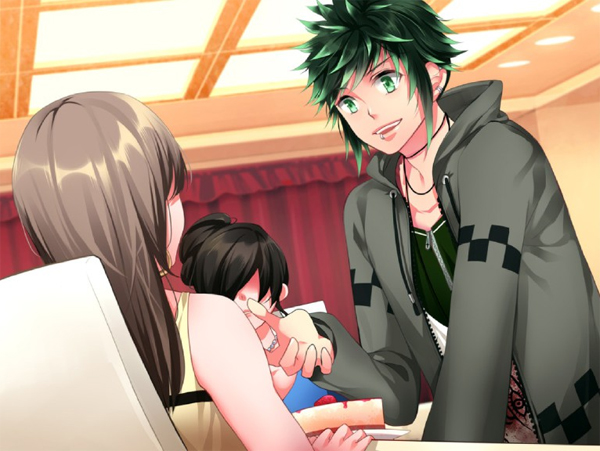
“Visual novels are such a small niche that it would be nearly impossible to make back the money put into it,” explains Sakata. “MangaGamer has released sales data in the past, and everyone’s been shocked at how few copies actually sell. Add to that the fact that Japanese companies are used to selling VNs at significantly higher prices than most Westerners want to spend, and you find that negotiating a license becomes very difficult. In the end, we vote with our money. The surprising success of localizations like 999 and Dangan Ronpa have proven that there IS an audience for these things, and companies have definitely shown themselves more willing to take risks on VNs in recent years.”
Guo adds, “Not a lot of people know about this genre, and it’s going to take a lot of time for the market to expand. Because the market here is small, there’s not much profit from it, which is why big companies are reluctant to import these types of games (especially when considering the cost of localization).”
It doesn’t help, she says, that many EVNs that do get released are low-quality due to budgetary and time constraints. It’s a vicious cycle, and the only way to break it is to up the ante. “In my personal (and quite brutal) opinion, VN developers need to start treating the game development like an actual business instead of a hobby. One has to really push the quality and really be willing to take high risks to produce something that’d be on-par or surpass the Japanese VN standards. I think sakevisual is taking the lead in this – at least, I know the budget that went into [Backstage Pass] is probably higher than any other EVN ever made. It’s a high risk we are taking, but I think the idea behind this is to show the community that English visual novels are just as good and well worth the money.”
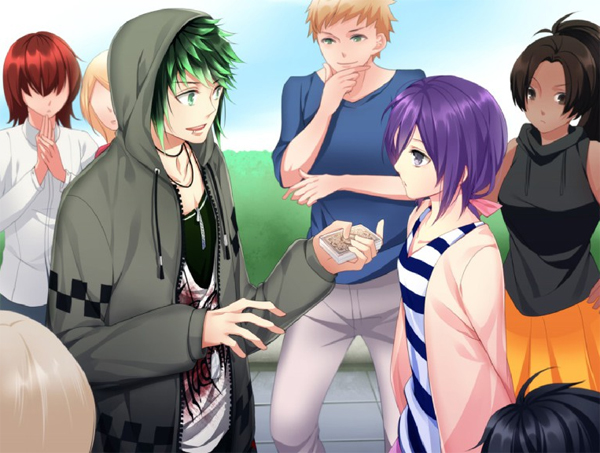
In addition to their bigger-budget titles, however, sakevisual has also published several smaller-scale free releases as well, such as Ripples and My Magical Cosplay Cafe. According to Sakata, these games serve dual purposes as both samplers for introducing newcomers to the genre and as a means to (hopefully) keep future prices from inflating. “The fastest way to lower the price of a game is to make it popular. The more people who are interested, the more we can lower the price. To that end, we’ve provided some free games so that people can give VNs a try without having to put any money down. We hope that by expanding the audience, we’ll be able to provide games at lower prices for everyone.”
As with any art, however, money plays second fiddle to storytelling and creativity. For Sakata, the magic of making a VN lies in the interactive and dynamic nature of the narrative. “The cool part about visual novels is the branching storyline. Instead of writing a single story, I get to explore different outcomes. I remember as a kid, my teacher used to make up stories, and the kids in the class would all vote on what the hero would do next (I think we were sneakily being introduced to tabletop gaming). With visual novels, it’s a similar situation, except the writer has to guess in advance where the reader will want to make a decision.”
Like most game developers, the sakevisual team enjoys playing VNs as well as making them. When questioned about their favorites, both Sakata and Solusod immediately cited 999: Nine Hours, Nine Persons, Nine Doors. “I have played very few,” Solusod admits. “Most of them were sakevisual games that I beta-tested. But I recently played through 999: Nine Hours, Nine Persons, Nine Doors and I was hooked!”
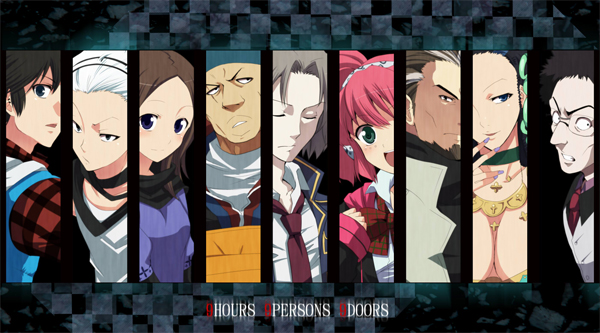
Likewise, Tabula says the only traditional VN he’s played that he didn’t help create was Shira Oka. He notes that he also enjoys the Walking Dead series, which, although it is not typically considered a VN series, is actually very similar to the genre in both structure and mechanics. As for Guo, Tokimeki Memorial Girl’s Side, Alice in the Country of Hearts, Hakuouki: Demon of the Fleeting Blossom, Starry Sky, and Sangoku Rensenki are at the top of her list.
Finally, we talked about other recent or upcoming projects the team has been working on. Solusod, as always, is a busy bee, mentioning DVD releases of parts of both A Certain Magical Index and A Certain Scientific Railgun S. His voice can also be heard in the upcoming anime movie One Piece: Film Z, as well as the Code:Breaker series, Rei Ogami, and Part 13 of Fairy Tail, in which he will be returning as the voice of Midnight. Guo, meanwhile, is working on a few games which are still under development, and Tabula has contributed his musical talents to Soyasushi Production’s most recent free-to-download VN, Six Rules.
As for future sakevisual titles, Backstage Pass is far from the end of the line. “Aside from Backstage Pass, we have two continuations planned,” Sakata says. “There’s Every Sunrise, the long-awaited sequel to Ripples (and the prequel to something else), and we’ll be starting work on the next Jisei chapter shortly.”
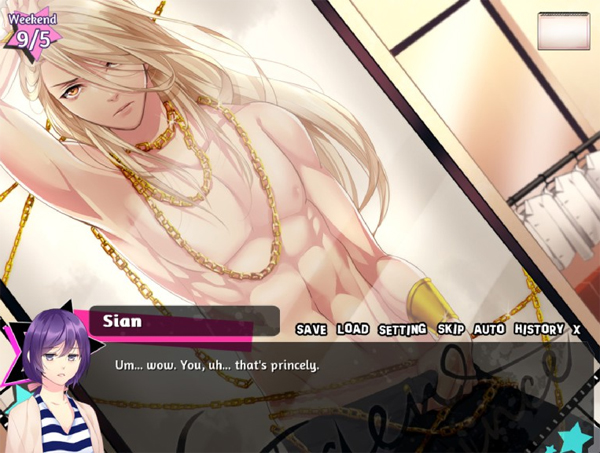
For now, visit the official Backstage Pass website to learn more about the game, or check out the official Steam page to purchase an early access copy.

 …WOOLY DESERVES BETTER LOL!
…WOOLY DESERVES BETTER LOL!